ID 101093494


Funded by the European Union. Views and opinions expressed are however those of the author(s) only and do not necessarily reflect those of the European Union or the European Education and Culture Executive Agency (EACEA). Neither the European Union nor EACEA can be held responsible for them.
Project ID: 101093494
Programme(s): Erasmus+ (ERASMUS+)
Topic(s): ERASMUS-YOUTH-2022-CB
Type of action: ERASMUS Lump Sum Grants
Starting date: 1 January 2023
End date: 31 December 2024
IL PROGETTO
Il progetto è un ERASMUS-YOUTH-2022-CB secondo le regole del Programma Erasmus Plus. Il progetto Visual Thinking 4 You(th) ha l’obiettivo generale di promuovere l’inclusione sociale dei giovani dislessici tra i 13 e i 19 anni, attraverso il pensiero visuale, che consiste nel trasmettere ed esporre idee attraverso immagini semplici e facilmente riconoscibili. L’obiettivo di questo metodo è migliorare il livello di apprendimento dello studente permettendogli, attraverso l’uso di immagini, di comprendere meglio le idee, definire gli obiettivi, identificare i problemi e generare nuovi concetti ed è particolarmente efficace per coloro che hanno peculiarità cognitive come le persone dislessiche. In questo contesto, l’animatore socio-educativo, figura mirata dalle attività del progetto, si dimostra essere un elemento chiave per il coinvolgimento di questi giovani.
Obiettivi specifici:
1.Miglioramento del grado di conoscenza da parte degli operatori giovanili sulla dislessia e sul potenziale del pensiero visuale come strumento per l’inclusione e l’apprendimento. Alla fine della prima attività formativa sarà registrato un miglioramento di almeno il 60%.
2.Costruzione di strategie di comunicazione per coinvolgere i giovani dislessici di età compresa tra i 13 e i 19 anni all’interno delle organizzazioni giovanili che offrono approcci di apprendimento innovativi e complementari all’istruzione formale. Alla fine del primo workshop, la percentuale di giovani che si avvicinano a queste organizzazioni aumenterà di almeno il 30% rispetto ai valori registrati inizialmente;
3.Creazione di metodologie di apprendimento incentrate sul pensiero visuale specificamente per i giovani dislessici al fine di aumentare il loro grado di integrazione e apprendimento. Alla fine del secondo workshop, l’approccio adottato con i giovani di età compresa tra i 13 e i 19 anni sarà almeno il 60% più efficace e integrativo rispetto alle metodologie più tradizionali.
ABOUT THE PROJECT
The project will be an ERASMUS-YOUTH-2022-CB according to Erasmus Plus Programme rules.
The Visual Thinking 4 You(th) project, has the general objective of promoting the social inclusion of dyslexic young people between 13 and 19 years old, through visual thinking, which consists in transmitting and exposing ideas through simple and easily recognizable images.
The objective of this method is to improve the learner’s learning level by allowing him, through the use of images, to better understand ideas, define objectives, identify problems and generate new concepts and it is particularly effective for those who have cognitive peculiarities such as dyslexic people.
In this context, the socio-educational animator, a figure targeted by the project activities, proves to be a key element for the involvement of these young people.
specific objectives:
- Improvement of the degree of knowledge by the youth workers of dyslexia and the potential of visual thinking as a tool for inclusion and learning. At the end of the first training activity will be recorded an improvement of at least 60%.
- Construction of communication strategies to engage dyslexic youth ages 13-19 within youth organizations that offer innovative and complementary learning approaches to formal education. At the end of the first workshop, the percentage of youth approaching these organizations will increase by at least 30% over the values initially recorded;
- Creation of learning methodologies focused on visual thinking specifically for dyslexic youth in order to increase their degree of integration and learning. At the end of the second workshop, the approach adopted with young people aged 13-19 will be at least 60% more effective and integrative than more traditional methodologies.
IL PARTENARIATO
SOS DIRITTI E LEGALITA’- ITALY
LEAD PARTNER

SOS diritti e legalità è un’associazione che da anni promuove l’effettività dei diritti a 360°, recente è
l’approvazione del progetto Europe nel settore VET del programma Erasmus+, 2021-2-IT01-KA210-
VET-000048180, dal titolo “Verso un futuro indipendente, responsabile, inclusivo e sostenibile”,
incentrato sull’inclusione sociale e sull’effettività del diritto alla formazione per le persone autistiche.
Anche in questo caso, il target group che il progetto vuole abbracciare è rappresentato da individui che
presentano specificità cognitive che richiedono approcci e metodi innovativi. Partendo da questo filone,
SOS diritti e legalità ha voluto fortemente continuare sui temi del diritto all’inclusione e all’apprendimento
con particolare focus ai giovani dislessici dai 13 ai 19 anni.
SOS Diritti e Legalità is an association that has been promoting the effectiveness of all-round rights for years, recent is the approval of the Europe project in the VET sector of the Erasmus+ program, 2021-2-IT01-KA210- VET-000048180, entitled “Towards an independent, responsible, inclusive and sustainable future.” focused on social inclusion and the effectiveness of the right to training for people with autism.
Again, the target group that the project aims to embrace is individuals who exhibit cognitive specificities that require innovative approaches and methods. Building on this strand, SOS Rights and Legality strongly wanted to continue on the themes of the right to inclusion and learning with a particular focus on dyslexic youth aged 13 to 19.
Association for progress, education and lobbying PEL- Skopje

Association for progress, education and lobbying PEL Skopje, da qui in avanti indicato anche con
l’acronimo PEL è da anni attiva nel settore della gioventù per contribuire all’effettività dei diritti promossi
dalla Commissione Europea, soprattutto con riferimento ai soggetti con minori opportunità, per questo
investe tante energie nella formazione e nel riconoscimento della figura dell’animatore come concreto
fattore di cambiamento sociale. Tra i diversi contributi dati nel tema, troviamo il progetto Youth Workers
International Networks, del programma Erasmus+, 608525-EPP-1-2019-1-IT-EPPKA2-CBY-ACPALA
promosso col supporto di A.T.I.C. Lo scopo del progetto è quindi quello di aumentare la leadership degli
operatori giovanili, attraverso lo scambio di buone pratiche tra organizzazioni e associazioni europee ed
extraeuropee, laddove, per creare un percorso efficiente di educazione in questo campo è fondamentale
creare una solida rete tra organizzazioni di diversi paesi supportando soprattutto i paesi terzi in questo
lungo percorso di sviluppo delle proprie capacità regionali.
Association for progress, education and lobbying PEL Skopje, henceforth also referred to by
the acronym PEL has for years been active in the youth sector to contribute to the effectiveness of the rights promoted by the European Commission, especially with reference to those with fewer opportunities, for this invests so much energy in the training and recognition of the figure of the animator as a concrete factor of social change. Among the various contributions made in the theme, we find the project Youth Workers International Networks, of the Erasmus+ program, 608525-EPP-1-2019-1-IT-EPPKA2-CBY-ACPALA promoted with the support of A.T.I.C. Thus, the aim of the project is to increase the leadership of youth workers, through the exchange of best practices among European and
non-European, where, in order to create an efficient path of education in this field it is essential to
create a strong network between organizations from different countries by supporting especially non-EU countries in this long path of developing their regional capacities.
Bosnian Representative Association for Valuable Opportunities- BOSNIA HERZEGOVINA

Bosnian Representative Association for Valuable Opportunities, da qui in avanti indicato anche con
l’acronimo BRAVO, ha esperienza in oltre 80 progetti europei sia come coordinatore che come partner
con particolare riferimento al settore della gioventù. Sono diverse le proposte che si pongono in
continuità rispetto al focus di Virtual Thinking 4 You(th), a titolo meramente esemplificativo si cita Art of
creative thinking, 2019-3-BG01-KA105-077742, in progetto che ha lo scopo di trasmettere all’animatore
competenze e conoscenze sul pensiero creativo. Infatti, tale forma di pensiero può contribuire a
migliorare il potenziale e i risultati conseguiti dai giovani nel mondo dell’istruzione ma anche del lavoro.
Tali competenze si rivelano fondamentali per la presente proposta.
Bosnian Representative Association for Valuable Opportunities, henceforth also referred to by
the acronym BRAVO, has experience in more than 80 European projects both as a coordinator and as a partner with a focus on the youth sector. There are several proposals that stand in
continuity with respect to the focus of Virtual Thinking 4 You(th), by way of example only we mention Art of creative thinking, 2019-3-BG01-KA105-077742, in project that aims to impart to the animator
skills and knowledge about creative thinking. In fact, this form of thinking can contribute to
improve the potential and achievements of young people in education but also in the world of work.
Such skills prove to be fundamental to the present proposal.
Mladiinfo – Montenegro
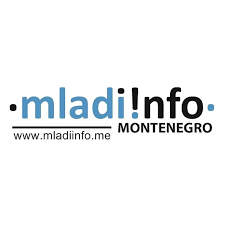
Mladiinfo Montenegro, da qui in avanti indicato anche con l’acronimo m!M, da anni si lascia guidare
dalla vision secondo cui “I giovani sono attori chiave dello sviluppo della società”. Su tale presupposto le
attività quotidiane di sensibilizzazione, partecipazione civica e di formazione sono incentrate
prevalentemente sul settore giovanile. Un progetto in ambito europeo già sviluppato che si rivelerà utile
in termini di skill e di complementarità tematica è “Circus pedagogy for inclusion in the Balkan”, 2020-2-
SI02-KA105-015570, Erasmus+, che educa gli animatori giovanili al fine di diversificare le loro
competenze pedagogiche, aumentare l’attrattiva e la qualità dei loro programmi e fornire loro un metodo
di lavoro innovativo e flessibile per aiutarli a raggiungere i loro obiettivi. Il progetto vuole sviluppare le
competenze pedagogiche degli animatori e nelle tecniche di animazione per offrire attività e programmi
che rispondano meglio ai bisogni degli individui e alle necessità dei gruppi più svantaggiati.
Mladiinfo Montenegro, henceforth also referred to by the acronym m!M, has for years been guided
by the vision that “Young people are key actors in the development of society.” On this assumption the
daily activities of outreach, civic participation and education are focused predominantly on the youth sector. A project in the European arena already developed that will prove useful
in terms of skills and thematic complementarity is “Circus pedagogy for inclusion in the Balkan”, 2020-2-
SI02-KA105-015570, Erasmus+, which educates youth workers in order to diversify their
pedagogical skills, increase the attractiveness and quality of their programs and provide them with an
of innovative and flexible work to help them achieve their goals. The project aims to develop the
animators’ pedagogical skills and in animation techniques to offer activities and programs
that better meet the needs of individuals and the needs of the most disadvantaged groups.
Beyond Barriers Association- ALBANIA

Beyond Barriers Association, da qui in avanti indicato anche con l’acronimo BBA, lavora fin dalla sua
nascita per promuovere l’inclusione, le pari opportunità, una migliore qualità di vita per tutti i giovani,
sostenere le basi per costruire una società migliore per le generazioni presenti e future e supportare il
riconoscimento dell’animazione giovanile e dell’educazione non formale. BBA ha svolto diverse attività
locali e progetti europei che si pongono in continuità con la presente proposta progettuale come:
“Access for all”, 2014-2-MK01-KA105-000242, una proposta che promuove la parità di accesso per tutti
e che offre l’opportunità e gli strumenti per rompere i pregiudizi, gli stereotipi ed aumentare la
consapevolezza sul tema dell’inclusione sociale con particolare riferimento a persone con minori opportunità o portatori di disabilità.
Beyond Barriers Association, henceforth also referred to by the acronym BBA, has been working since its
inception to promote inclusion, equal opportunities, a better quality of life for all young people,
support the foundations for building a better society for present and future generations, and support the
recognition of youth work and nonformal education. BBA has carried out several activities
local and European projects that are in continuity with this project proposal such as:
“Access for all,” 2014-2-MK01-KA105-000242, a proposal that promotes equal access for all
and provides the opportunity and tools to break down prejudices, stereotypes and increase
awareness on the issue of social inclusion with special reference to people with fewer opportunities or those with disabilities.
KICK OFF MEETING 12.01.2024 ROMA
Il 12 gennaio si è svolto il kick off del progetto VISUAL THINKING 4 YOUTH, progetto finanziato dalla Commissione europea nell’ambito del programma ERASMUS+, Capacity Building nel settore Gioventù.
Il progetto è stato scritto e coordinato dall’associazione italiana SOS DIRITTTI E LEGALITÀ, e il partneriato è costituito dall’ associazione PEL dalla Macedonia del Nord, Beyond Barriers Association dall’Albania, BRAVO dalla Bosniaed Herzegovina, MLADINFO dal Montenegro e ATIC dalla Romania.
Due rappresentati per ogni associazione, per un totale di 12 partecipanti si sono dati appuntamento a Roma, presso la sede di SOS DIRITTI E LEGALITÀ per dare il via al progetto.
L’incontro è iniziato con un “ICE-BREAKING GAME” per conoscersi, per sperimentare in prima persona le tematiche del tema del progetto: ai partecipanti è stato chiesto di descrivere con un’immagine il proprio nome, al fine di permettere ad ognuno di memorizzare meglio il nome di ogni partecipante, attivando i canali del visual thinking. Al termine di quest’attività è stato chiesto ad ognuno di esprimeredei giudizi sull’attività: se fosse semplice, divertente ed efficace. Il 100% dei partecipanti ha risposto in maniera positiva.
Successivamente è stata presentata la roadmap del progetto, analizzando le varie tasks, le tempistiche, i risultati che si vogliono raggiungere e l’impatto di tale progetto. È stato un momento molto importante dove ogni partner ha potuto esprimere i propri dubbi e domande e ciò ha permesso di approfondire in modo ulteriore il programma di svolgimento di attività, i risultati di apprendimento, lo svolgimento dei compiti e di responsabilità oltre che rafforzare la partnership per lavorare nel miglior modo possibile all’implementazione del progetto.
Divisi in gruppi tutti i partecipanti hanno avuto l’opportunità di lavorare attivamente ai deliverables di questo kick-off meeting, ovvero:
- Determinazione di buone pratiche all’interno dello staff per la buona governance di progetto;
- Definizione di metodi ed indicatori per effettuare le survey preliminari/successive alle attività internazionali, atte a testare il punto di partenza e i miglioramenti conseguiti dai partecipanti;
- definizione di indicatori di impatto dei risultati delle singole attività e del progetto.
Il kick-off meeting è stato anche l’occasione per discutere e approvare tutti insieme la strategia di comunicazione e di disseminazione da adottare durante tutta la durata del progetto.
SOS DIRITTI E LEGALITÀ, per questo incontro, ha adottato degli accorgimenti per essere più ecosostenibile possibile, scegliendo hotel vicini al luogo di incontro, promuovendo l’uso di mezzi pubblici, ed è stato limitato al massimo l’uso di carta, sfruttando invece le potenzialità del digitale.
Prossimo appuntamento sarà ad aprile a Podgorica in Montenegro per il training course “DYSLEXIA AND VISUAL THINKING”, stay tuned!!
KICK OFF MEETING 12.01.2024 ROME
On January 12th, the kick-off meeting for the VISUAL THINKING 4 YOUTH project took place, a project funded by the European Commission under the ERASMUS+ program, Capacity Building in the field of Youth. The project was written and coordinated by the Italian association SOS DIRITTTI E LEGALITÀ, with a partnership consisting of the PEL association from North Macedonia, Beyond Barriers Association from Albania, BRAVO from Bosnia and Herzegovina, MLADINFO from Montenegro, and ATIC from Romania.
Two representatives from each association, totaling 12 participants, gathered in Rome at the SOS DIRITTI E LEGALITÀ headquarters to launch the project. The meeting began with an ice-breakeing activity to get to know each other, to experiment the project’s theme through learging-by-doing approach. Participants were asked to describe their names with an image to help everyone remember each other’s name. After this activity, the Project Manager asked everyone to express an opinion in terms of: difficulty, engagement, and effectiveness. Thr 100% of the participants expressed a positive opinioni, fining the activitiy easy to do, engaging, and effective.
Following that, the project’s roadmap was thoroughly explained, including the various tasks, desired outcomes, and the impact of the project. This crucial moment allowed each partner to voice doubts and questions, further delving into the program’s activity schedule, learning outcomes, task execution, and responsibilities. It strengthened the partnership and enhanced collaboration to ensure the successful implementation of the project.
Participants were divided into groups to actively work on the deliverables for this kick-off meeting, which included:
- Determining best practices within the staff for project governance.
- Defining methods and indicators for conducting preliminary/follow-up surveys after international activities to assess participants’ starting points and improvements achieved.
- Defining impact indicators for the results of individual activities and the overall project.
The kick-off meeting also provided an opportunity to collectively discuss and approve the communication and dissemination strategy to be adopted throughout the project. For this meeting, SOS DIRITTI E LEGALITÀ took eco-friendly measures by choosing hotels close to the venue, promoting the use of public transportation, and minimizing paper usage.
The next meeting is scheduled for April in Podgorica, Montenegro, for the “DYSLEXIA AND VISUAL THINKING” training course. Stay tuned!

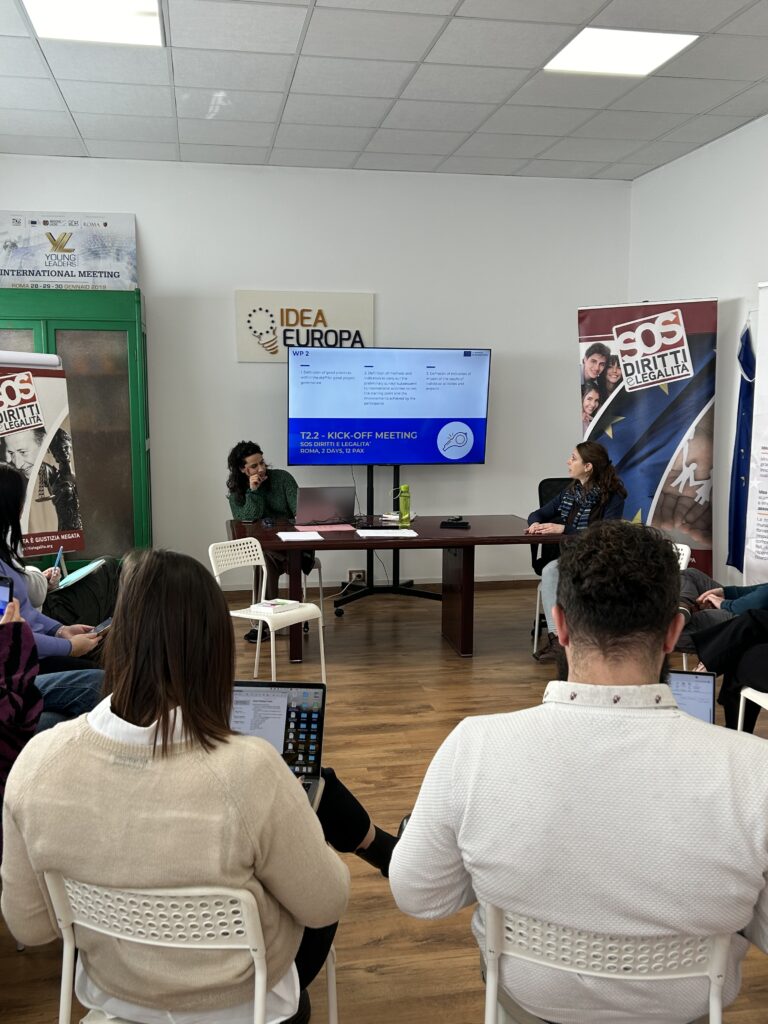


Risultati del Kick off:
Results of kick off meeting:
TRAINING COURSE DISLESSIA E VISUAL THINKING
Dal 18 al 21 aprile 2024, 50 ragazzi provenienti da Albania, Macedonia, Bosnia, Montenegro e Italia, si sono incontrati a Podgorica, Montenegro, per prendere parte al training course ” dislessia e visual thinking”, nell’ambito del progetto ” Visual thinking 4 you(th) finanziato dalla Commissione Europea.
Il training course è stato ospitato dall’associazione montenegrina MladInfo, e ha visto una prima fase di preparazione, dove ogni associazione ha lanciato la call di selezione dei partecipanti, nello specifico 8+2 membri staff ad associazione. Una volta selezionati, è stato sottoposto loro un test per testare il
livello di competenze di partenza in termini di conoscenza della dislessia e del metodo di visual thinking, e di conseguenza, sulla base delle risposte, modulare il contenuto del training course.
Lo scopo di questo training course era di trasferire ai partecipanti adeguate conoscenze sui temi
della dislessia giovanile e sul visual thinking:
Giorno 1:
- presentazione del programma Erasmu+. della struttura del progetto e dell’agenda del training;
- getting to know each other;
- round table: i partecipanti condividono aspettative, paure e contributi;
- il facilitatore introduce la dislessia con metodologia partecipativa dell’aula;
- serata inteculturale;
Giorno 2:
- sessione formativa, grazie il coinvolgimento di uno psico-linguista esperto, che ha fatto una panoramica sulla dislessia tra i giovani in Europa e come funzionano i processi di apprendimento e di acquisizione delle informazioni;
- interactive workshop for visual thinking: condivisione di testi come visti da un dislessico;
- approfondimento da parte dell’esperto psico-linguista sul visual thinking e sugli effetti in termini di apprendimento;
- esperienza di vita di un ragazzo dislessico;
- gruppo di riflessione e sezione domande/ risposte;
Giorno 3:
- Breve tour di Podgorica accompagnati da una guida locale;
- divisi in gruppi i partecipanti creano video con lo scopo di creare maggiore formazione ed informazione sui temi della dislessia e il visual thinking;
Giorno 4:
- Tour di Virpazar e lago Skadar
- seconda parte di realizzazione e registrazione video;
- survey finale per valutare il miglioramento dei partecipanti;
- prossimi steps e valutazione del progetto
Risultato tangibile di questo training course sono stati i 12 video Video didattici informativi e di sensibilizzazione su dislessia e visual thinking, realizzati dai partecipanti.
Successivamente i video sono stati editati dal partner bosniaco Bravo.
Il prossimo appuntamento sara a Sarajevo, Bosnia per il workshop su “Strategie comunicative per coinvolgere i giovani dislessici nella realtà associativa”, previsto dal 11 al 14 giugno 2024.
DYSLEXIA AND VISUAL THINKING TRAINING COURSE
From April 18th to 21st, 2024, 50 youngsters from Albania, Macedonia, Bosnia, Montenegro, and Italy gathered in Podgorica, Montenegro, to take part in the training course “Dyslexia and Visual Thinking,” within the framework of the project “Visual Thinking 4 You(th)” funded by the European Commission.
The training course was hosted by the Montenegrin association MladInfo and began with an initial preparation phase, during which each association launched the participant selection call, specifically targeting 8+2 staff members per association. Once selected, participants underwent a test to assess their baseline level of skills in terms of dyslexia knowledge and the visual thinking method. Based on the responses, the content of the training course was tailored accordingly.
The aim of this training course was to impart appropriate knowledge to the participants on the topics of youth dyslexia and visual thinking:
Day 1:
- Presentation of the Erasmus+ program, project structure, and training agenda;
- Getting to know each other;
- Round table: participants share expectations, fears, and contributions;
- The facilitator introduces dyslexia using participatory classroom methodology;
- Intercultural evening;
Day 2:
- Training session, featuring the involvement of an expert psycho-linguist who provided an overview of dyslexia among young people in Europe and how learning and information acquisition processes function;
- Interactive workshop for visual thinking: sharing texts as seen by a dyslexic individual;
- Further exploration by the psycho-linguist expert on visual thinking and its effects on learning;
- Life experience of a dyslexic individual;
- Reflection group and Q&A session;
Day 3:
- Short tour of Podgorica accompanied by a local guide;
- Participants divided into groups to create videos aimed at providing more education and information on dyslexia and visual thinking topics;
Day 4:
- Tour of Virpazar and Lake Skadar;
- Second part of video creation and recording;
- Final survey to assess participants’ improvement;
- Next steps and project evaluation.
The tangible result of this training course were the 12 informative and educational videos on dyslexia and visual thinking, made by the participants.
The videos were then edited by our Bosnian partner, Bravo.
The next appointment will be in Sarajevo, Bosnia, for the workshop on “Communicative Strategies to Engage Dyslexic Youth in Reality.”
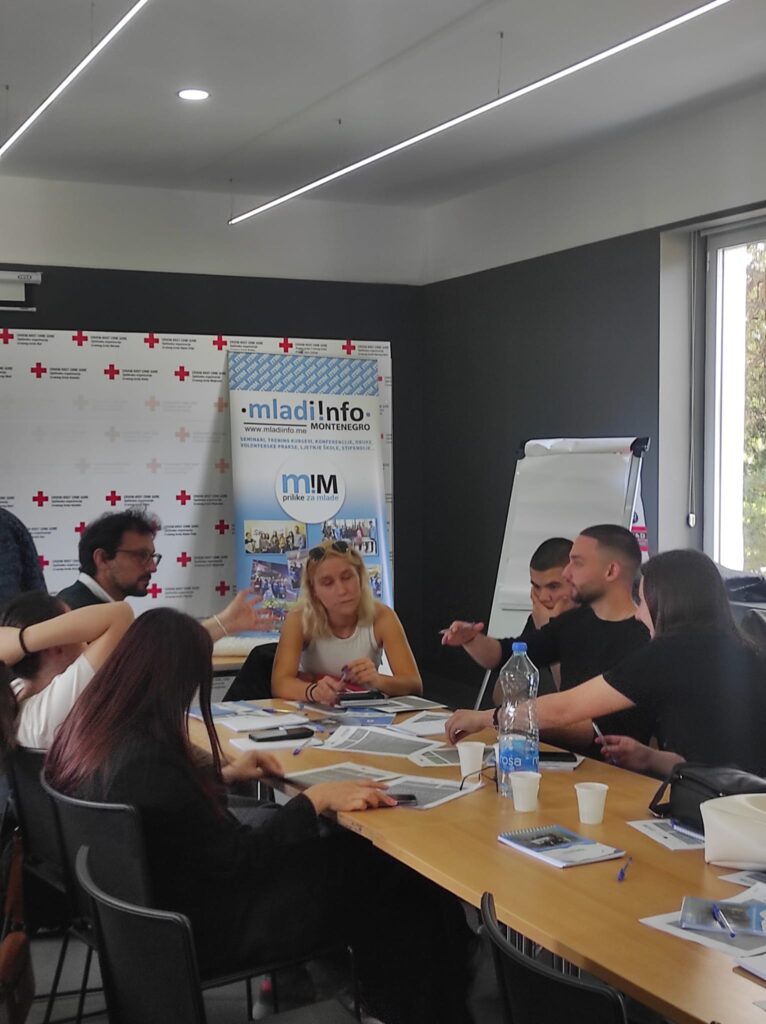
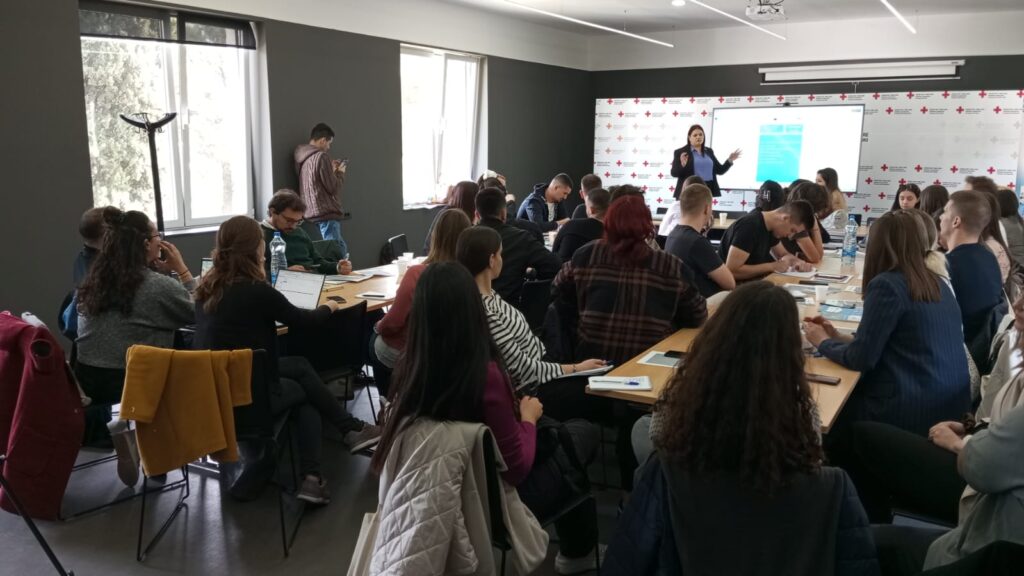

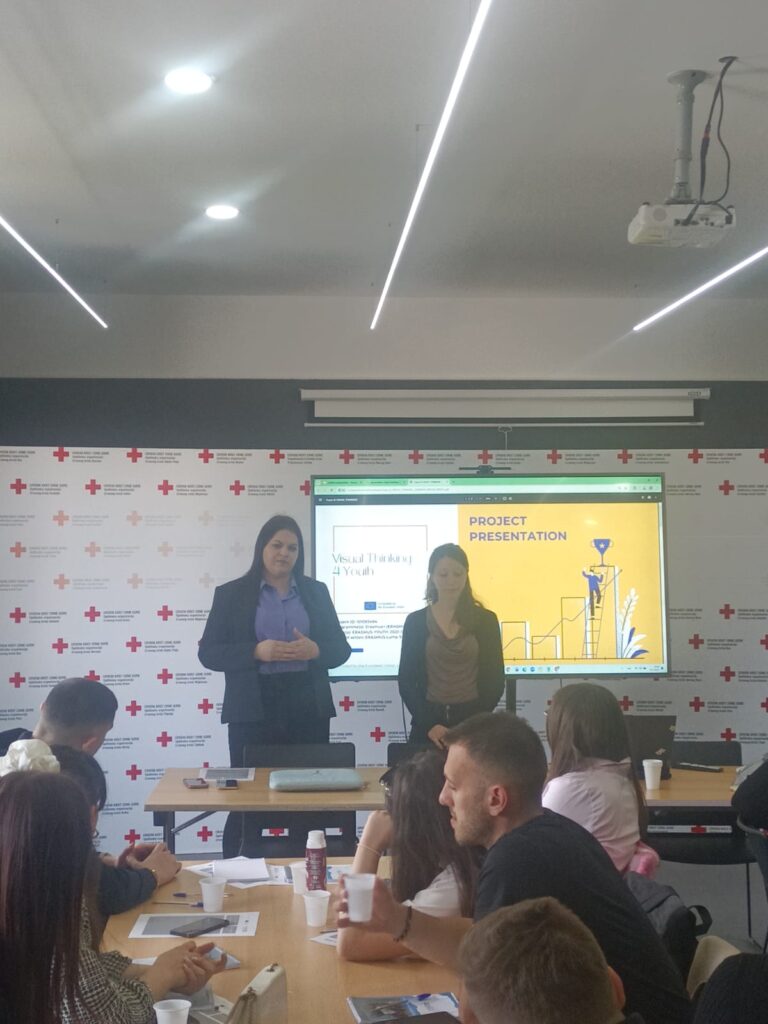
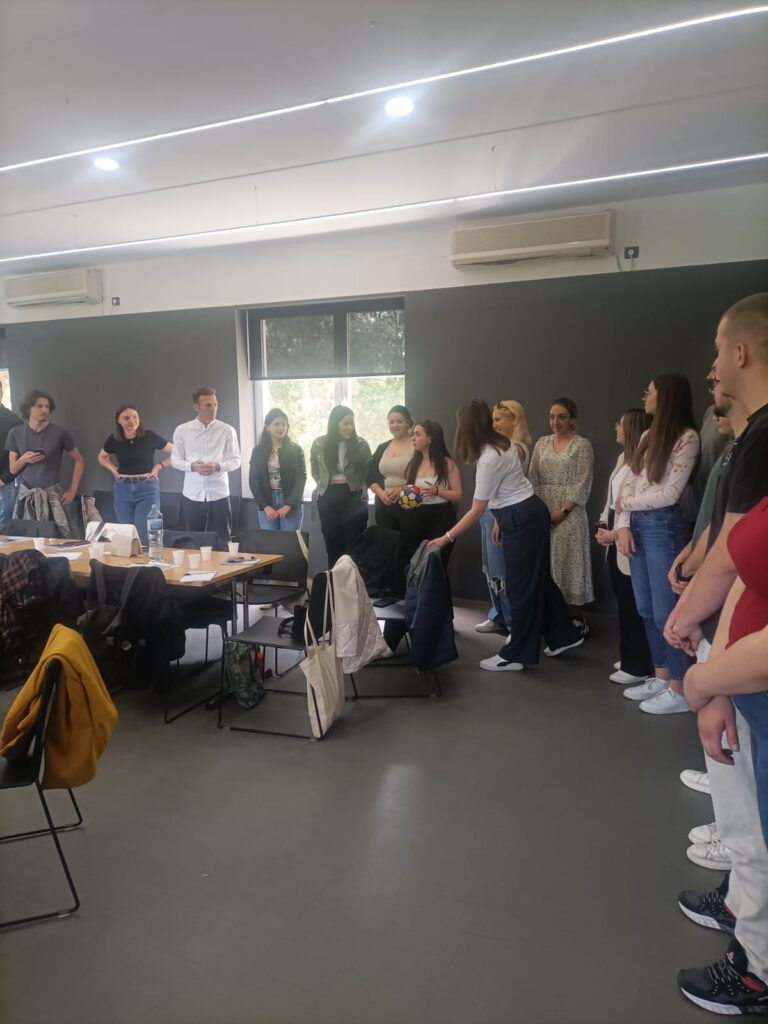
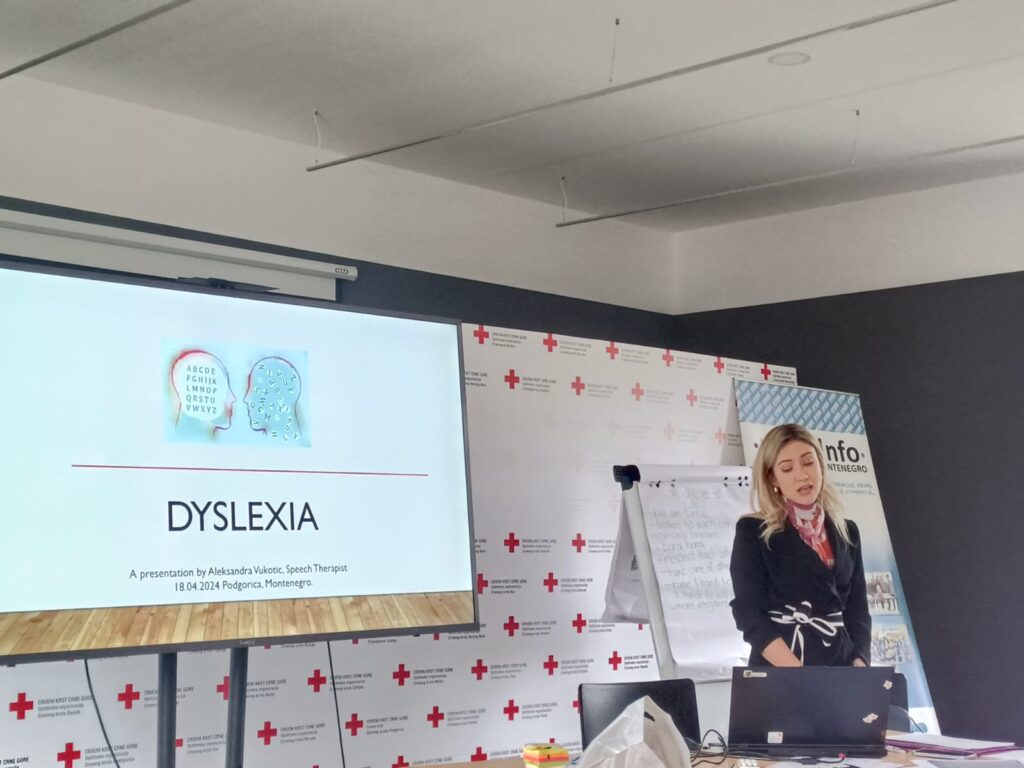
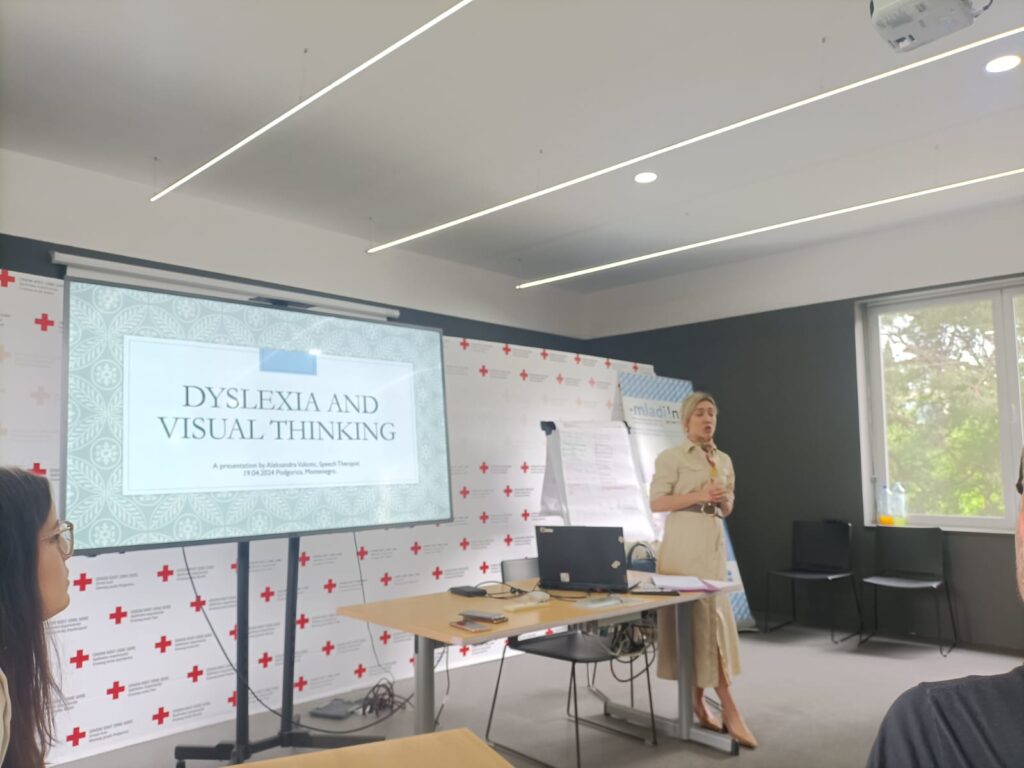
Video didattici informativi e di sensibilizzazione su dislessia e
visual thinking.
Educational videos informative and of awareness on dyslexia and
visual thinking.
Di seguito i video informativi sulla dislessia e il visual thinking, realizzati dai partecipanti durante il training course a Podgorica.
Below are the informative videos on dyslexia and visual thinking, made by participants during the training course in Podgorica.
Workshop su “Strategie comunicative per coinvolgere i giovani dislessici nella realtà associativa”
Dal 11 al 14 giugno 2024, Sarajevo ha ospitato un workshop innovativo dal titolo “Strategie comunicative per coinvolgere i giovani dislessici nella realtà associativa”. L’evento si è svolto nell’ambito del progetto “Visual Thinking 4 You(th)” ed è stato organizzato dall’associazione bosniaca BRAVO. Circa 50 partecipanti provenienti da Italia, Macedonia del Nord, Albania, Montenegro e Bosnia ed Erzegovina hanno preso parte a questo importante incontro. Il workshop è stato progettato per fornire ai partecipanti strategie e strumenti efficaci per coinvolgere i giovani dislessici all’interno delle organizzazioni e delle associazioni. Attraverso sessioni interattive e collaborazioni, i partecipanti hanno esplorato metodi di comunicazione inclusiva e tecniche di pensiero visivo per superare le barriere che i giovani dislessici possono incontrare.
Giorno 1: Il primo giorno è iniziato con attività di benvenuto e presentazioni dei partecipanti e del progetto. Le attività di ice-breaking hanno aiutato i partecipanti a conoscersi meglio e a creare un ambiente collaborativo.
Giorno 2: La seconda giornata ha visto un approfondimento sugli strumenti per una comunicazione efficace. Sessioni interattive e attività di gruppo hanno permesso ai partecipanti di praticare scenari di comunicazione e di sviluppare piani di comunicazione specifici per i giovani dislessici.
Giorno 3: Il terzo giorno è stato dedicato all’elaborazione di strategie inclusive. I partecipanti hanno lavorato in gruppi per raffinare i loro piani di comunicazione, con un focus particolare sulle tecniche di messaggistica e targeting per coinvolgere i giovani dislessici. Un laboratorio di feedback ha offerto ulteriori opportunità per migliorare le strategie sviluppate.
Giorno 4: L’ultimo giorno ha incluso la presentazione dei risultati del workshop e la finalizzazione di un manuale digitale contenente le linee guida sviluppate durante l’evento. La cerimonia di chiusura ha visto la presentazione degli esiti del workshop e un pranzo d’addio per celebrare il successo dell’incontro.
Il workshop “Strategie comunicative per coinvolgere i giovani dislessici nella realtà associativa” ha rappresentato un’opportunità preziosa per i partecipanti di acquisire nuove competenze e di esplorare approcci innovativi alla comunicazione inclusiva. Grazie all’impegno di tutte le associazioni coinvolte e alla partecipazione attiva dei giovani, l’evento ha posto le basi per una maggiore inclusione e partecipazione dei giovani dislessici nelle realtà associative.
Il prossimo evento sarà un Workshop su “Creazione di metodologie di apprendimento specifiche incentrate sul visual thinking per giovani dislessici”, e si svolgerà a Tirana dal 09 al 12 settembre 2024.
Di seguito il Manuale digitale realizzato dai partecipanti a Sarajevo.
Workshop on “Communicative Strategies to Engage Dyslexic Youth in Associative Life”
From June 11 to 14, 2024, Sarajevo hosted an innovative workshop titled “Communicative Strategies to Engage Dyslexic Youth in Associative Life.” The event took place as part of the “Visual Thinking 4 You(th)” project and was organized by the Bosnian association BRAVO. About 50 participants from Italy, North Macedonia, Albania, Montenegro, and Bosnia and Herzegovina took part in this significant meeting. The workshop was designed to provide participants with effective strategies and tools to engage dyslexic youth within organizations and associations. Through interactive sessions and collaborations, participants explored inclusive communication methods and visual thinking techniques to overcome the barriers dyslexic youth may encounter.
Day 1: The first day started with welcome activities and introductions of the participants and the project. Ice-breaking activities helped participants get to know each other better and create a collaborative environment.
Day 2: The second day focused on tools for effective communication. Interactive sessions and group activities allowed participants to practice communication scenarios and develop specific communication plans for dyslexic youth.
Day 3: The third day was dedicated to developing inclusive strategies. Participants worked in groups to refine their communication plans, with a particular focus on messaging and targeting techniques to engage dyslexic youth. A feedback workshop provided further opportunities to improve the developed strategies.
Day 4: The final day included the presentation of the workshop results and the completion of a digital manual containing the guidelines developed during the event. The closing ceremony featured the presentation of the workshop outcomes and a farewell lunch to celebrate the success of the meeting.
The workshop “Communicative Strategies to Engage Dyslexic Youth in Associative Life” provided a valuable opportunity for participants to acquire new skills and explore innovative approaches to inclusive communication. Thanks to the commitment of all involved associations and the active participation of the youth, the event laid the groundwork for greater inclusion and participation of dyslexic youth in associative life.
The next event will be a Workshop on “Creating Specific Learning Methodologies Focused on Visual Thinking for Dyslexic Youth,” which will take place in Tirana from September 9 to 12, 2024.
Below is the digital manual created by the participants in Sarajevo.



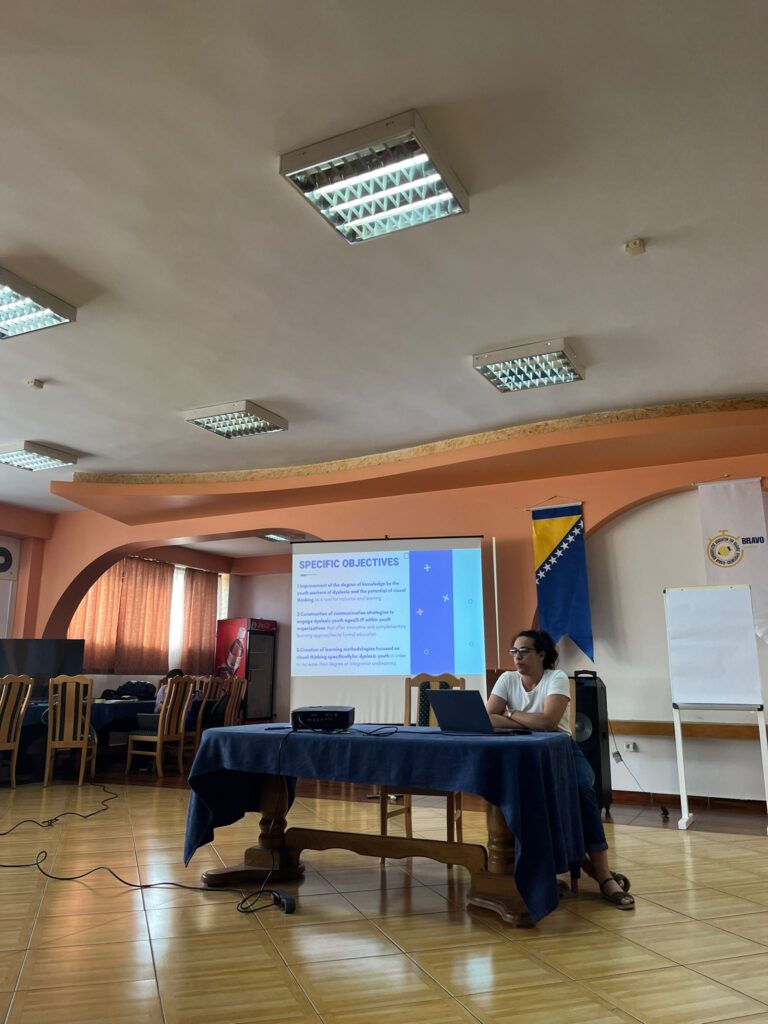
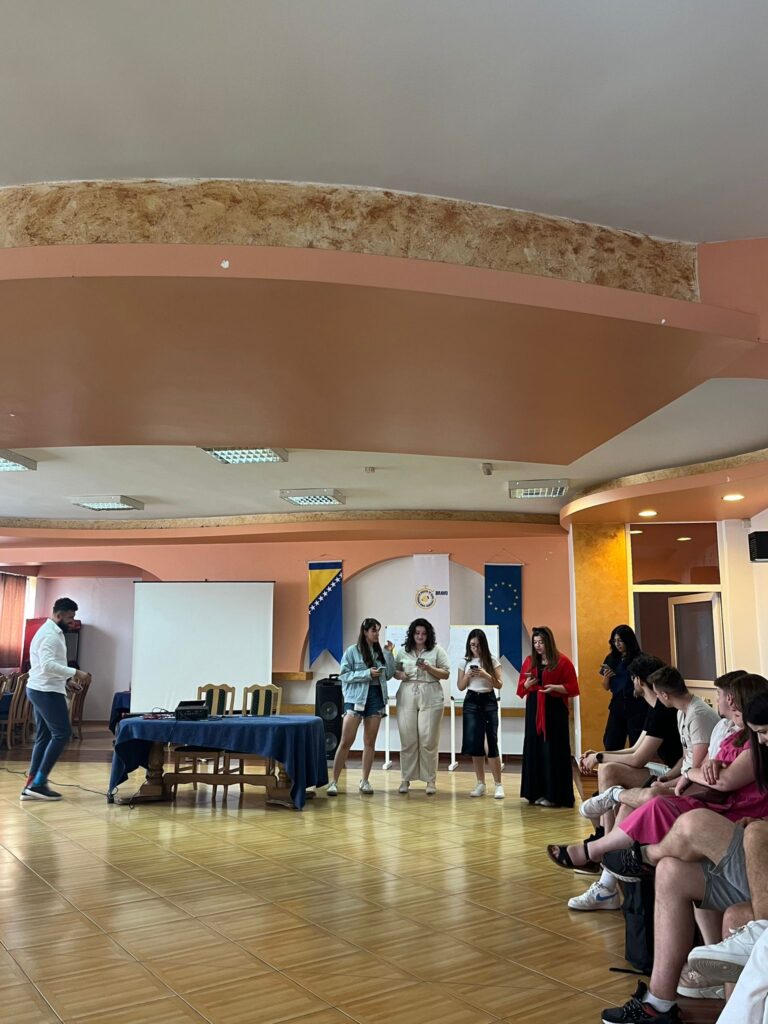
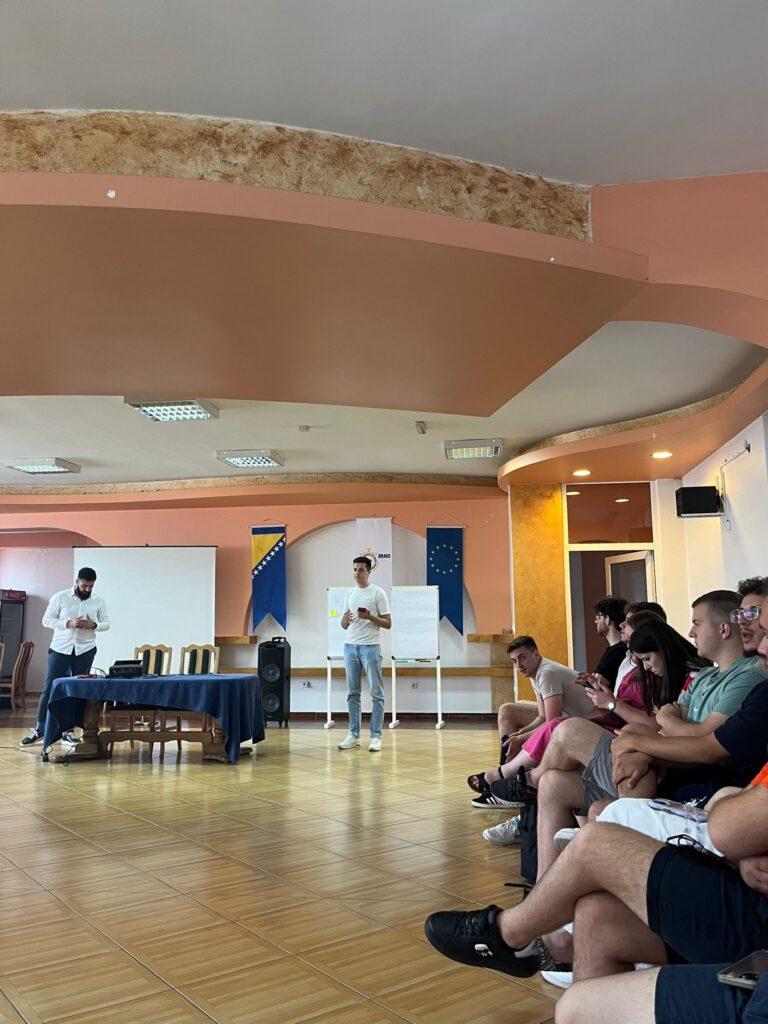
“MANUALE DIGITALE SU STRATEGIE COMUNICATIVE PER COINVOLGERE I GIOVANI DISLESSICI NELLA REALTÀ ASSOCIATIVA”.
“DIGITAL MANUAL STRATEGY COMMUNICATIVE FOR INVOLVE YOUNG PEOPLE WITH DYSLEXIA IN REALITY ASSOCIATIVE”.
Workshop: “Creazione di metodologie di apprendimento specifiche incentrate sul visual thinking per giovani dislessici”
Dal 09 al 12 settembre, 50 ragazzi provenienti da Italia, Bosnia, Macedonia, Albania e Montenegro, si sono ritrovati a Tirana per il terzo Workshop: “Creazione di metodologie di apprendimento specifiche incentrate sul visual thinking per giovani dislessici” L’evento si è svolto nell’ambito del progetto “Visual Thinking 4 You(th)” ed è stato ospitato dall’associazione albanese BEYOND BARRIERS.
GIORNO 1: La giornata è iniziata con gioco “Drow your name”,L’idea principale è quella di disegnare il proprio nome in modi creativi, originali o stilizzati, usando diversi materiali, tecniche o stili artistici. Successivamente ognuno ha cercato di indovinare, attraverso il disegno, il nome di ognuno. questo non solo ha stimolato la lo creatività, ma ha permesso di entrare ancora più in contatto con il metodo del pensiero visivo, ovvero di comunicaare attraverso le immagini. La parte finale della giornata è stata dedicata alla spiegazione dell’agenda dei prossimi giorni.
GIORNO 2 : La giornata è iniziata con la condivisione delle “paure, aspettative e ccontributi” che ognuno ha sul progetto. è stato chiesto loro di scrivere su post-it colorati, quali fossero le loro paure, le loro aspettative e il loro contributo. Dopo di ciò è stata fatta una panoramica sul cosa era stato realizzato nei meetings passati. Indivuati tra i partecipanti chi ha partecipato anche agli eventi precednti, è stato chiesto loro di spiegare ai ” nuovi” cosa avevano imparato fino ad ora sulla dislessia e sul pensiro visivo. Quest’attività ha permesso, non solo di rendere partecipativi i ragazzi stessi, ma anche di avere un feedback diretto per gli organizzatori.
Successivamente, attraverso il ” laerning by doing”, si è voluto entrare nello specifico tema del workshop, ovvero mostrare ai partecipanti come comunicare senza utilizzare le parole o la scrittura, ma solo con l’ausilio di immagini. Divisi in gruppi, ognuno di essi aveva due parole da rappresentare sottoforma di disegno, una volta individuato il disegno associato alla parola, hanno creato una frase di senso compiuto che contenesse le due parole assegnate prima, ed infine, una volta creata la frase hanno rappresentato la frase sottoforma di disegno. Successivamente si è passati al ” guess the emotion”, sempre divisi in gruppi, ad ognuno di essi è stata assegnata un emozione, da rappresentare e da far indovinare agli altri gruppi. Tutte queste attività hanno stimolato la loro creatività ma anche il saper lavorare insieme come gruppo, stimolandoli a utilizzare il pensiero visivo come strumento di inclusione per i dislessici.
GIORNO 3: il terso giorno è stato dedicato alla creazione di mappe concettuali. Stumento indispensabile per chi è dislessico. Divisi in gruppi, ad ognuno è stato assegnato un testo tra, arte,musica,cinema,sport,storia e animali. Partendo dalla lettura del testo, i partecipanti hanno inizialmente lavorato sul processo di eleaborazione di una mappa concettuale, come si costruisce. Una volta compreso il processo, è stato chiesto ai partecipanti di realizzare un vero e proprio video tutorial su come si costruisce una mappa concettuale, in modo tale da diventare un strumento utile per tutti gli youth worker.
GIORNO 4: nell’ultimo giorno del workshop, i ragazzi hanno finalizzato la realizzazione dei video che faranno parte del ” Video-corso su creazione di metodologie di apprendimento specifiche incentrate sul
visual thinking per giovani dislessici.” Successivamente ogni gruppo ha presentato in pleanaria il lavoro svolto, e infine ai ragzzi è stato consegnato lo Youth Pass, come certificato di acquisizione di competenze.
Workshop: “Creation of Specific Learning Methodologies Centered on Visual Thinking for Young Dyslexics”
From September 9 to 12, 50 young people from Italy, Bosnia, North Macedonia, Albania, and Montenegro gathered in Tirana for the third Workshop: “Creation of Specific Learning Methodologies Centered on Visual Thinking for Young Dyslexics.” The event was part of the “Visual Thinking 4 You(th)” project and was hosted by the Albanian association BEYOND BARRIERS.
DAY 1: The day began with the game “Draw Your Name.” The main idea was to creatively, originally, or stylishly draw one’s name using different materials, techniques, or artistic styles. Subsequently, everyone tried to guess each other’s names based on the drawings. This activity not only stimulated creativity but also allowed participants to engage more with the method of visual thinking, that is, to communicate through images. The final part of the day was dedicated to explaining the agenda for the upcoming days.
DAY 2: The day started with sharing “fears, expectations, and contributions” regarding the project. Participants were asked to write on colored post-its their fears, expectations, and contributions. After that, there was an overview of what had been achieved in previous meetings. Participants who had also attended previous events were asked to explain to the “newcomers” what they had learned so far about dyslexia and visual thinking. This activity allowed not only for active participation from the young people but also provided direct feedback for the organizers.
Later, through “learning by doing,” the specific theme of the workshop was explored, specifically showing participants how to communicate without using words or writing, but only with images. Divided into groups, each group had two words to represent in drawing form. Once they identified the drawings associated with those words, they created a coherent sentence that included the two assigned words and ultimately represented that sentence in drawing form. Next, they engaged in “guess the emotion,” where each group was assigned an emotion to depict and have the other groups guess. All these activities stimulated their creativity as well as their ability to work together as a group, encouraging them to use visual thinking as an inclusion tool for dyslexics.
DAY 3: The third day was dedicated to creating conceptual maps, an essential tool for those who are dyslexic. Divided into groups, each was assigned a text from categories such as art, music, cinema, sports, history, or animals. Starting from reading the text, participants initially worked on the process of developing a conceptual map and how to construct it. Once they understood the process, participants were asked to create a proper video tutorial on how to build a conceptual map, making it a useful tool for all youth workers.
DAY 4: On the last day of the workshop, the young people finalized the videos that will be part of the “Video Course on Creating Specific Learning Methodologies Centered on Visual Thinking for Young Dyslexics.” Subsequently, each group presented their work in a plenary session, and finally, the youth were awarded the Youth Pass as a certification of acquired skills.

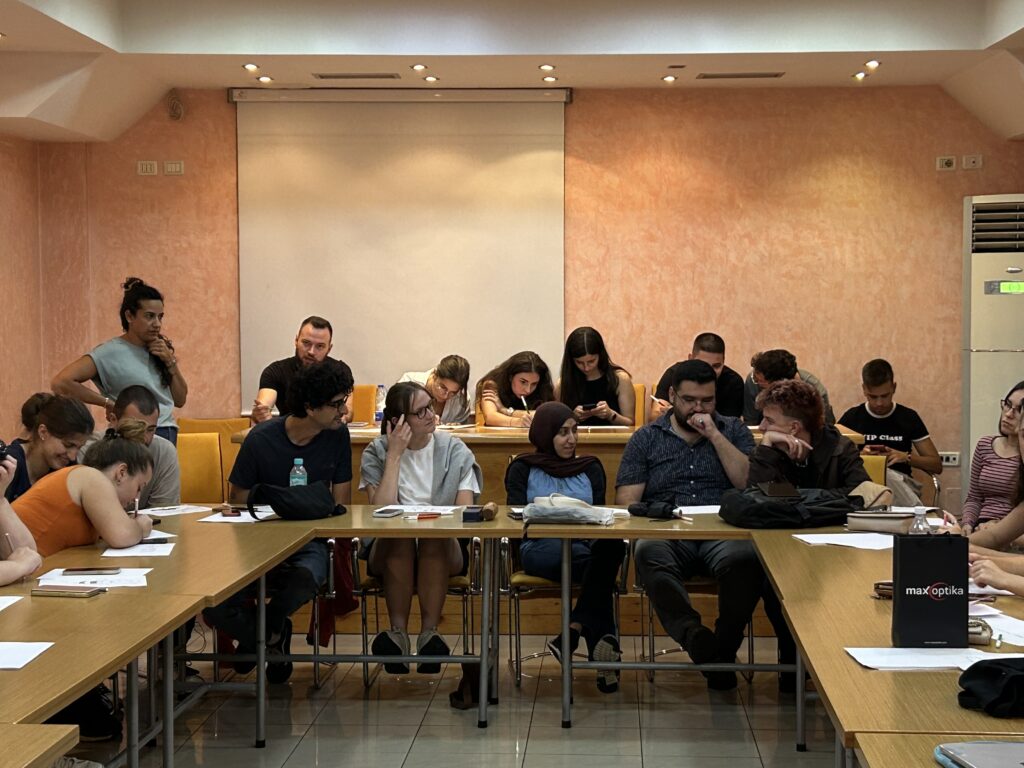
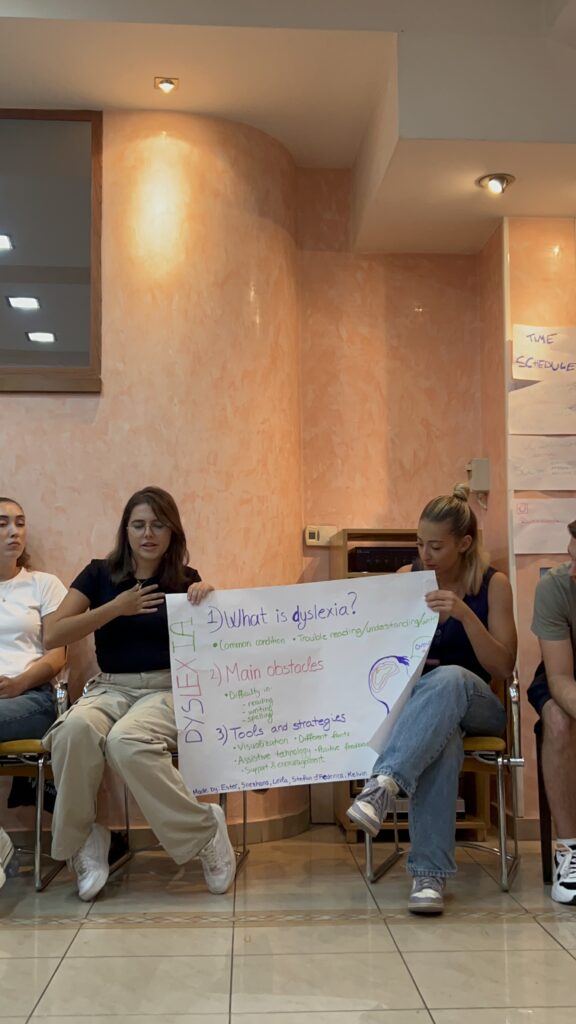
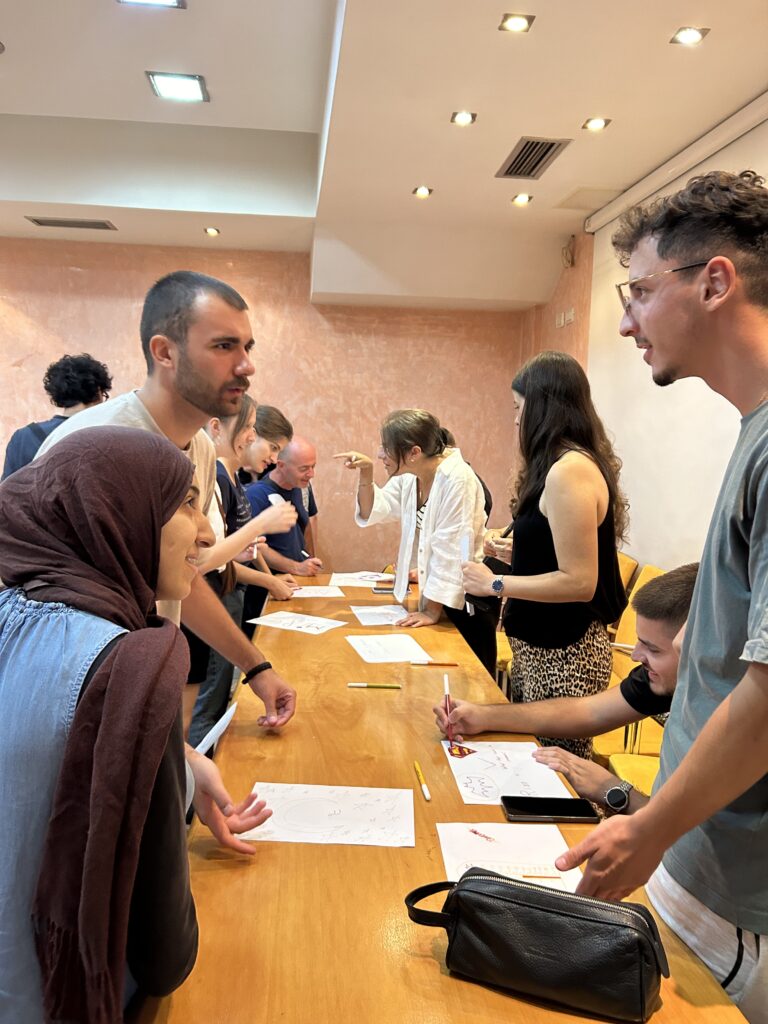
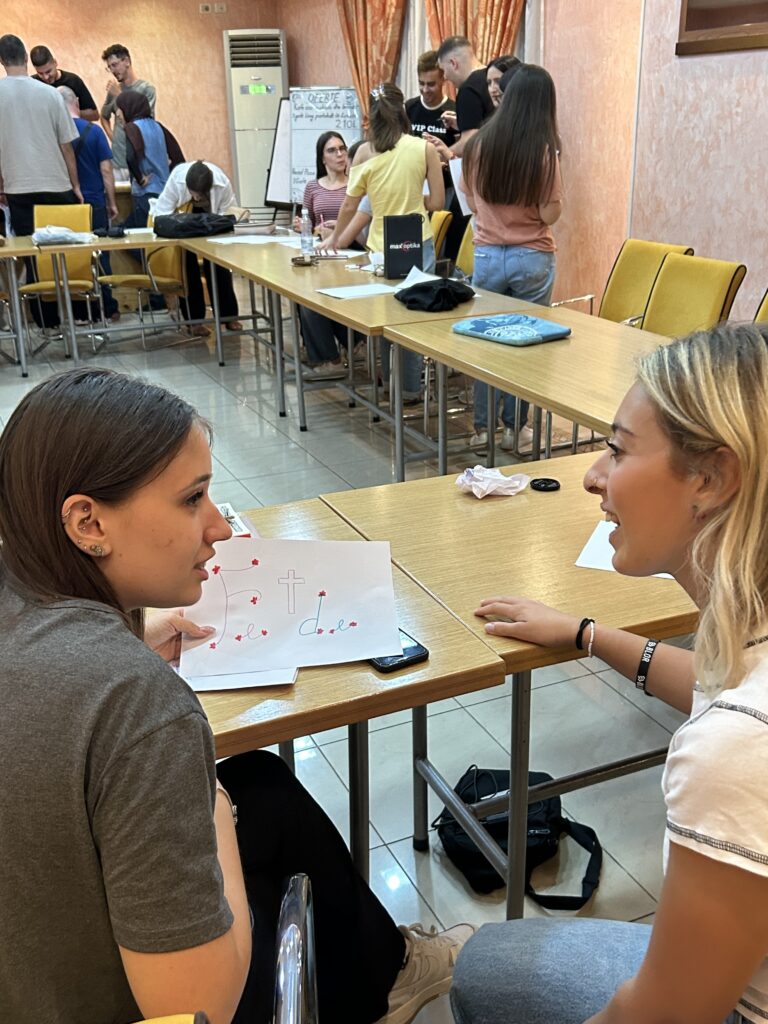
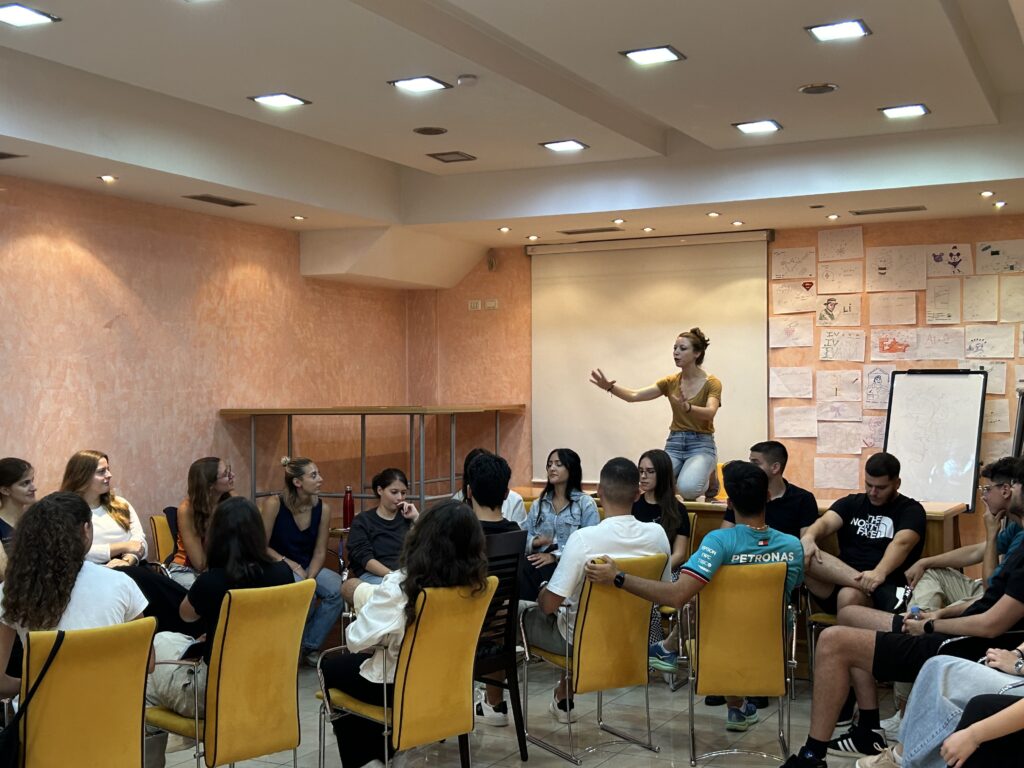
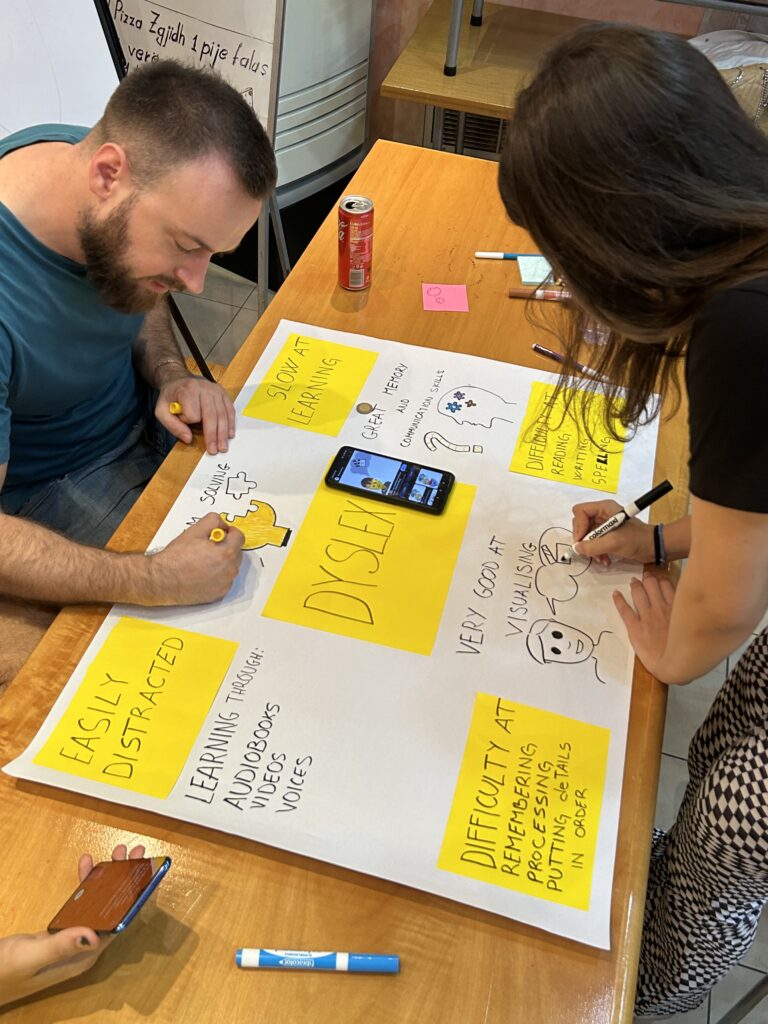


VIDEO-CORSO SU CREAZIONE DI METODOLOGIE DI APPRENDIMENTO SPECIFICHE INCENTRATE SUL VISUAL THINKING PER GIOVANI DISLESSICI
VIDEO COURSE ON CREATING SPECIFIC LEARNING METHODOLOGIES CENTERED ON VISUAL THINKING FOR YOUNG DYSLEXICS
Di seguito il video-corso realizzato dai partecipanti durante il workshop a Tirana.
Below the video-course produced by participants during the workshop in Tirana.
Closing Meeting del Progetto “Visual Thinking 4 Youth”: un Successo a Skopje per il Futuro dell’Educazione Non Formale
Il 18 novembre 2024, si è tenuto a Skopje, in Nord Macedonia, il closing meeting del progetto europeo “Visual Thinking 4 Youth”, coordinato da SOS Diritti e Legalità. L’evento ha segnato la conclusione di un percorso ambizioso che ha coinvolto partner provenienti da diverse realtà dei Balcani:
- Association for Progress, Education and Lobbying PEL (Skopje, Nord Macedonia)
- Bosnian Representative Association for Valuable Opportunities (BRAVO) (Bosnia-Erzegovina)
- Mladiinfo (Montenegro)
- Beyond Barriers Association (Albania).
Obiettivi del Progetto
“Visual Thinking 4 Youth” ha promosso l’utilizzo di strumenti di pensiero visivo (visual thinking) per potenziare la partecipazione attiva dei giovani nei processi educativi e sociali. Il progetto si è posto l’obiettivo di integrare tecniche innovative di comunicazione visiva nell’ambito dell’educazione non formale e dell’animazione socioeducativa, favorendo nuove competenze per educatori e animatori giovanili.
Focus del Closing Meeting
Durante l’incontro di chiusura, i rappresentanti dei partner hanno discusso i risultati raggiunti e come questi possano essere integrati nella quotidianità delle loro attività. I principali temi affrontati sono stati:
- Risultati Ottenuti
- Sviluppo di strumenti pratici per educatori e giovani, tra cui un kit formativo di tecniche di pensiero visivo e una piattaforma online per la condivisione di risorse.
- Formazione di oltre 150 educatori e animatori giovanili attraverso workshop internazionali e locali.
- Coinvolgimento diretto di oltre 500 giovani in attività educative che hanno valorizzato la comunicazione visiva come mezzo di espressione e inclusione.
- Strategia di Comunicazione
È stata sottolineata l’importanza della comunicazione digitale per ampliare l’impatto del progetto. Attraverso i social media e le piattaforme di condivisione, i partner hanno diffuso le buone pratiche sviluppate, raggiungendo un pubblico più ampio e stimolando l’interesse di altre organizzazioni giovanili. - Sostenibilità dei Risultati
Si è discusso di come garantire la sostenibilità dei risultati del progetto nel tempo. Le organizzazioni partner si sono impegnate a integrare le metodologie apprese nelle loro attività future e a creare sinergie con altre iniziative europee. - Integrazione dei Risultati nella Quotidianità
È stato ribadito l’impegno a includere il pensiero visivo come parte integrante delle attività di animazione e socioeducazione. Questo approccio consentirà di migliorare la comunicazione e il coinvolgimento dei giovani, in particolare quelli provenienti da contesti svantaggiati.
Prospettive Future
Il meeting si è concluso con la promessa dei partner di continuare a collaborare, utilizzando i risultati del progetto come base per nuove iniziative. “Visual Thinking 4 Youth” ha dimostrato come l’innovazione pedagogica possa diventare un catalizzatore per l’inclusione sociale e lo sviluppo delle competenze giovanili.
Ringraziamenti e Conclusioni
Un ringraziamento speciale va a tutti i partner e ai partecipanti che hanno reso possibile il successo del progetto. SOS Diritti e Legalità, in qualità di coordinatore, ha espresso la propria soddisfazione per i risultati raggiunti e ha sottolineato l’importanza di proseguire sulla strada dell’innovazione educativa, rafforzando la rete di collaborazione tra i paesi partecipanti.
“Visual Thinking 4 Youth” si chiude con un bilancio positivo e una visione chiara: formare i giovani con strumenti innovativi per affrontare le sfide di un mondo in continua evoluzione.
Closing Meeting of the “Visual Thinking 4 Youth” Project: A Success in Skopje for the Future of Non-Formal Education
On November 18, 2024, the closing meeting of the European project “Visual Thinking 4 Youth” took place in Skopje, North Macedonia, coordinated by SOS Diritti e Legalità. The event marked the conclusion of an ambitious journey that involved partners from various Balkan organizations:
- Association for Progress, Education and Lobbying PEL (Skopje, North Macedonia)
- Bosnian Representative Association for Valuable Opportunities (BRAVO) (Bosnia and Herzegovina)
- Mladiinfo (Montenegro)
- Beyond Barriers Association (Albania).
Project Objectives
“Visual Thinking 4 Youth” promoted the use of visual thinking tools to enhance young people’s active participation in educational and social processes. The project aimed to integrate innovative visual communication techniques into non-formal education and socio-educational animation, fostering new skills for educators and youth workers.
Focus of the Closing Meeting
During the closing meeting, representatives of the partner organizations discussed the achieved results and how these can be integrated into their daily activities. The main topics addressed were:
- Achieved Results
- Development of practical tools for educators and youth, including a training kit on visual thinking techniques and an online platform for resource sharing.
- Training of over 150 educators and youth workers through international and local workshops.
- Direct involvement of more than 500 young people in educational activities that emphasized visual communication as a means of expression and inclusion.
- Communication Strategy
The importance of digital communication to amplify the project’s impact was highlighted. Through social media and sharing platforms, partners disseminated the developed best practices, reaching a broader audience and stimulating interest from other youth organizations. - Sustainability of Results
Discussions focused on ensuring the sustainability of the project’s outcomes over time. Partner organizations committed to integrating the acquired methodologies into their future activities and creating synergies with other European initiatives. - Integration of Results into Daily Practices
The commitment to include visual thinking as an integral part of animation and socio-educational activities was reaffirmed. This approach will improve communication and engagement with young people, particularly those from disadvantaged backgrounds.
Future Perspectives
The meeting concluded with a promise from the partners to continue collaborating, using the project’s outcomes as a foundation for new initiatives. “Visual Thinking 4 Youth” has demonstrated how pedagogical innovation can act as a catalyst for social inclusion and the development of youth competencies.
Acknowledgments and Closing Remarks
Special thanks were extended to all the partners and participants who contributed to the project’s success. As the coordinator, SOS Diritti e Legalità expressed satisfaction with the results achieved and emphasized the importance of continuing along the path of educational innovation, strengthening the network of collaboration among participating countries.
“Visual Thinking 4 Youth” concludes on a positive note with a clear vision: equipping young people with innovative tools to face the challenges of an ever-changing world.


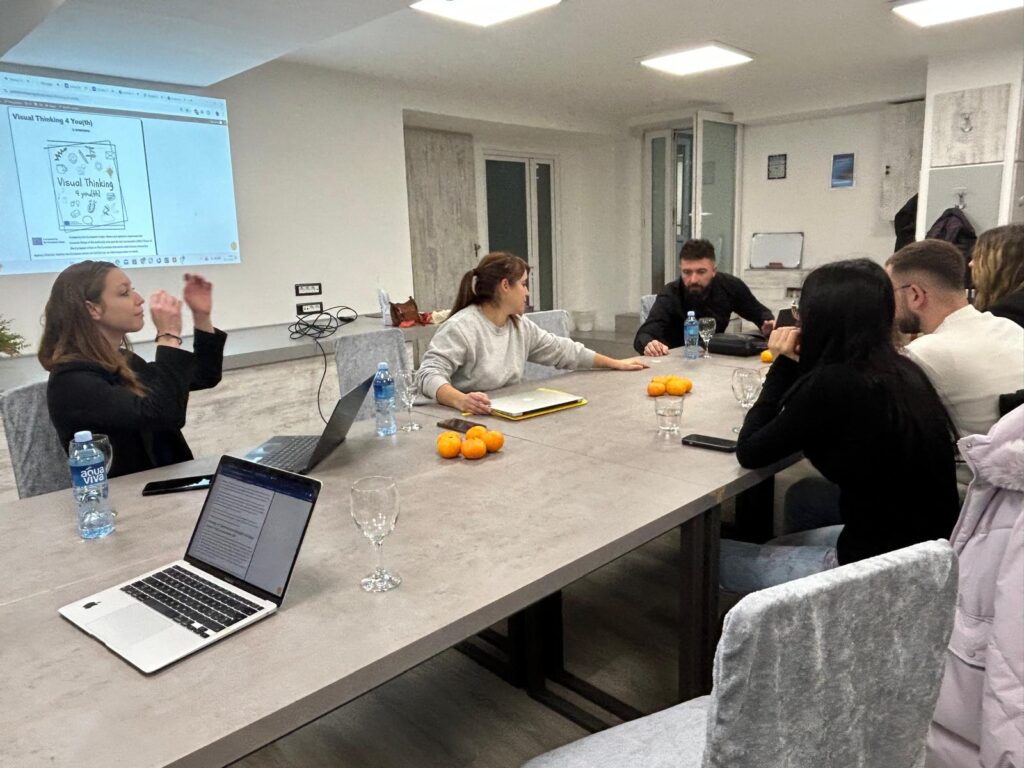
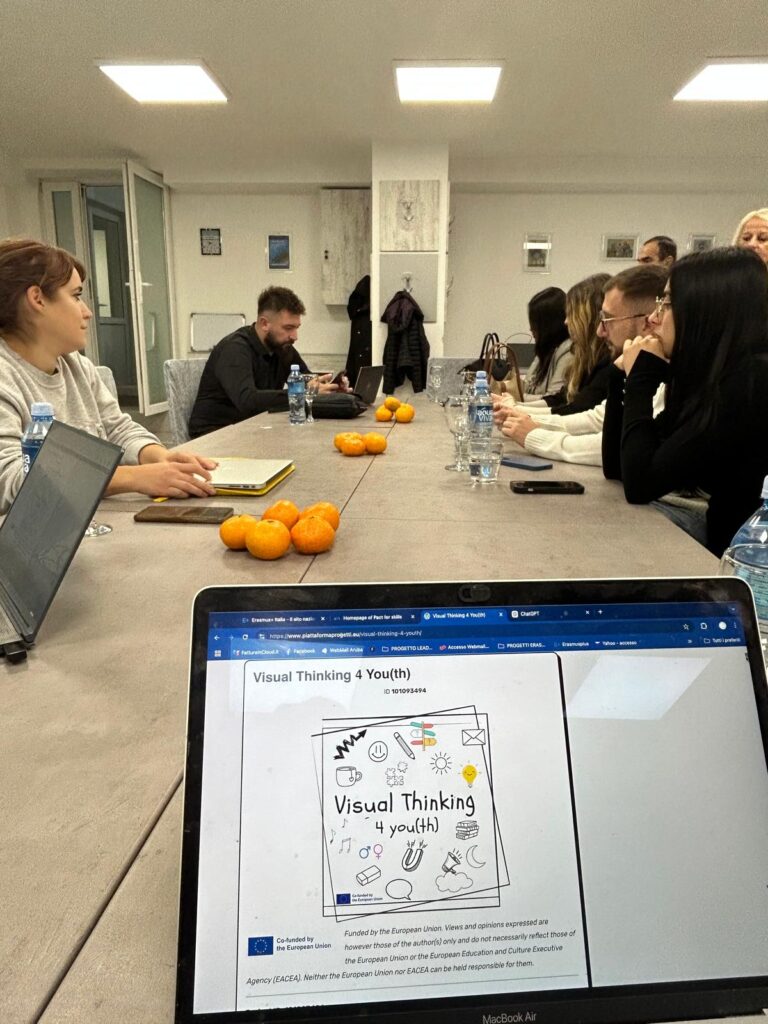
REPORT FINALE DI ATTIVITA’
final activity report
